📚About the Program
Master’s in Economics at University of Cologne
Course description This programme provides you with: state of the art tools for the quantitative and qualitative analysis of economic problems in specific markets, national economies, and the global economy, such as monetary policy, climate change, or development. a wide range of possibilities for specialisation and maximum flexibility in your choice of courses. ample opportunities to complement your expertise in economics by choosing from additional courses in management, political science and sociology. Contents The Master in Economics at the University of Cologne offers a research-oriented study programme with courses from a wide range of economic areas. As a student, you are largely free to choose the subjects you intend to concentrate on, and you can opt to focus on different areas within and between fields. The main topics are: ● Market Design and Behavior, ● Markets and Economic Policy, ● Empirical Methods and Data Analysis, ● Energy and Climate Change The empirical and analytical focus of the programme enables you to analyse economic phenomena using state-of-the-art research methods and to carry out research projects. Upon graduating from the programme, you will be prepared to enter a professional career in many private and public institutions in need of economic expertise. You may also opt for the continuation of your studies through a PhD programme in economic research. Structure The master’s programme carries 120 ECTS credits and compromises a “Core Section”, a “Specialisation Section”, “Supplementary Sections” and the “Master Thesis”. It equips you with knowledge of the theoretical foundations and methods and the ability to conduct applied and theoretical economic analyses. Apart from the Core Section, you will be able to flexibly choose your course curriculum largely following your individual preferences. The Core Section of the programme contains 24 credit points (four courses) and will introduce you to the central methods and insights of the main areas of modern economics: econometrics and statistics, macroeconomics and microeconomics. In the Specialisation Section you choose courses from the main areas that reflect your substantive orientation in which you want to proceed with your studies. In the specialisation on Empirical Methods and Data Analysis your focus is on the tools of empirical analysis. In Markets and Economic Policy your focus is largely on issues of public policy and the functioning of markets from a macroeconomic perspective. In Market Design and Behavior you focus on the microeconomic working of specific markets and how they should be regulated and the behavior of individuals in them. The Supplementary Section in Economics offers both specialisation and generalisation. A particular concentration on energy markets and climate economics is possible in our specialised field Energy and Climate Change which builds on and deepens methods and insights from various areas of the specialisation section. You may also acquire particular skills of our interest by choosing further courses from any of the fields in the specialization section. You can also complement and deepen your studies with courses from our Master in Economic Research programme. The Supplementary Section in Management and Social Science allows you venture into other fields within the Faculty, for example, complementing the study of labour markets with courses in Personnel Economics, deepening your understanding of public policy with expertise from political science, or of human behavior in Sociology. With the master’s thesis, you show your ability to apply the skills you have acquired throughout the programme and conduct your very own research with an aim to contribute to scientific knowledge. Required Documents: ●School leaving certificate/proof of having passed a university entrance exam ●Degree certificate (if already available), if not, please upload a preliminary degree overview ●Overview of subjects and grades (transcript of records) ●University grading system ●An officially certified translation if the original documents were not issued in German or English Language ●Applicants from China and Vietnam are required to also submit a current APS certificate. (for India: As of the winter semester 2023/24) ●English Language Certificate: Level B2/C1 (TOEFL Internet-based 93; IELTS average 6,5 - each single component 6,0; Cambridge qualifications 175; TOEIC 460-425-175; Abitur incl. 6 years)
Show less 